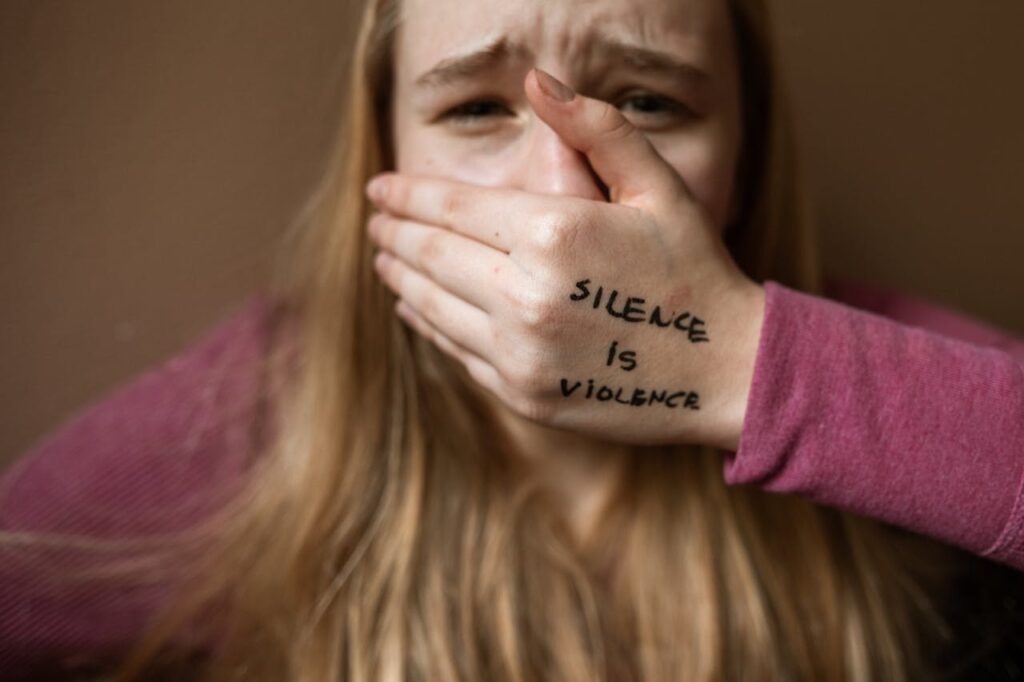Have you ever wondered if you were imagining things in your relationship? Maybe you distinctly remember an argument, but your partner insists it never happened. Perhaps you express your feelings, only to be told they’re overblown or unimportant.
This confusing and disorienting behavior is called gaslighting, and it can leave you feeling emotionally distraught and questioning your own sanity.
As someone who has studied emotional abuse, this article will empower you to recognize the signs of gaslighting and protect yourself from this manipulative tactic

What is Gaslighting?
Gaslighting is a form of emotional abuse that purposefully makes someone question their sanity, memories, or perception of reality, according to the American Psychological Association.
The term itself originated from the 1938 play “Gas Light,” where a husband manipulates his wife into believing she’s losing her mind. While the exact prevalence is difficult to measure, a study by the National Domestic Violence Hotline found that nearly a third (31%) of women in their survey reported experiencing emotional abuse by an intimate partner, with gaslighting being a common tactic
Here’s a breakdown of the key aspects of gaslighting:
(1) Manipulation
The abuser uses various tactics to twist situations, deny events, or dismiss the victim’s feelings.
(2) Doubting Reality
The victim is constantly second-guessing themselves and their perceptions, wondering if they’re overreacting or misremembering things.
(3) Power and Control
The ultimate goal of gaslighting is to control the victim and make them dependent on the abuser’s version of reality.
In summary, gaslighting can happen in various relationships, such as romantic partnerships, friendships, or even family dynamics. It can be incredibly damaging to a person’s mental health, causing confusion, anxiety, and a loss of self-esteem.
Signs of Gaslighting in Relationships
Gaslighting is a insidious form of emotional abuse that can be difficult to detect at first. Unlike a single outburst, it’s a pattern of manipulative behaviors aimed at chipping away at your confidence and sense of reality.
Let’s delve into some common tactics gaslighters use:
(1) Distortion of Reality:
(a) Denying Events: They may flatly deny things ever happened, even when you have clear evidence (e.g., “You never said you’d take care of the bills!” Partner scoffs “Are you sure you’re not just imagining things again?”). This creates confusion and makes you question your own memory.

(b) Rewriting History: They twist past events to fit their narrative, making you doubt your recollection (e.g., “We never agreed to go to your friend’s party this weekend. You must be misremembering”). This can be especially disorienting.
(c) Gaslighting by Proxy: The gaslighter might involve a third party to distort reality. This could involve having a friend or family member back up their version of events, making you question your own perception even further.
(d) Fabrication: The gaslighter might invent events or details that never happened, creating a confusing and fabricated reality. (e.g., They might claim you said something hurtful you never did.)
(e) Gaslighting by Omission: They might intentionally withhold information or selectively share details to paint a different picture of reality.
(f) Exaggeration or Minimization: They might exaggerate minor events to seem more significant or minimize major issues to downplay their impact. This creates confusion about the true nature of situations.
(g) Projection: The gaslighter might project their own negative emotions or actions onto you, making you feel responsible for their behavior. (e.g., They might accuse you of being jealous when they’re the one exhibiting jealous behavior.)
(2) Minimizing Your Feelings:
(a) Trivializing Your Emotions: They dismiss your feelings as unimportant or overblown (e.g., “You’re being so dramatic about a burnt dinner”). This invalidates your emotional experience and makes you feel like you’re overreacting.
(b) Labeling: Gaslighters might try to label your emotions as negative or undesirable to downplay their impact. (e.g., You express concern about their behavior, and they call you “needy” or “insecure.”)
(c) Comparisons: They might compare your feelings to a more extreme situation to make yours seem insignificant. (e.g., You’re hurt by their words, and they say, “At least you’re not going through what my friend is going through.”)
(d) Logical Fallacies: They might use twisted logic to dismiss your feelings. (e.g., You tell them you feel disrespected, and they counter with, “If you truly respected me, you wouldn’t feel this way.”)
(e) Minimizing Needs: They might downplay the importance of your needs and wants, making you feel selfish for even expressing them. (e.g., You mention feeling lonely, and they say, “You shouldn’t need that much attention.”)
(f) Focus on Intent: They might focus on their own intentions rather than the impact of their actions on you. (e.g., You’re upset by a hurtful comment, and they say, “But I didn’t mean it that way!”)
(3) Shifting the Blame:
(a) Taking No Responsibility: They deflect blame for their actions onto you, making you feel responsible for their behavior (e.g., “If you hadn’t been so critical, I wouldn’t have gotten angry”). This tactic absolves them of any wrongdoing and leaves you feeling confused and guilty.
(b) Playing the Victim: Gaslighters often portray themselves as the victim in the situation, deflecting blame and manipulating your empathy. (e.g., They might make you feel guilty for expressing your concerns by claiming you’re “making them feel bad about themselves.”)
(c) Guilt Tripping: They might use guilt trips to make you feel responsible for their actions or their negative emotions. (e.g., They might say, “If you truly loved me, you wouldn’t be upset by this.”)
(d) Causal Fallacy: They might create a false cause-and-effect relationship to shift blame. (e.g., They might say, “You made me lose my temper by bringing this up.”)
(e) Comparative Blame: They might deflect blame by comparing your actions (often minor) to their own transgressions, making yours seem worse. (e.g., You might express frustration with their behavior, and they counter with, “At least I’m not doing what you did last week!”)
(f) Baiting and Switching: They might provoke you with hurtful words or actions and then blame you for their reaction. (e.g., They might say something inflammatory, and when you react angrily, they accuse you of being “overly sensitive.”)

Manipulation Through Lies:
(a) Telling Blatant Lies: They lie to you with a straight face, even when confronted with evidence to the contrary (e.g., “I was never even at that bar last night!” Multiple witnesses saw them there). This creates an atmosphere of distrust and makes you question everything they say.
(b) Using Your Words Against You: They twist your words or take things you’ve said out of context to make you seem unreasonable (e.g., “You always say I don’t listen, but you never listen to me either!”). This leaves you frustrated and questioning your communication skills.
(c) Isolating and Controlling: Gaslighting in Public: They belittle or humiliate you in front of others, then tell you that you’re being oversensitive or misunderstood their “joke” (e.g., Cracking a joke about your insecurities at a friend’s gathering). This isolates you from your support system and makes you feel dependent on them.
Effects of Gaslighting
(1) Erosion of Self-Esteem: Constant denial, blame-shifting, and minimizing of feelings lead the receiver to question their own judgment, worth, and sanity. This can cause significant damage to their self-esteem and confidence.
(2) Anxiety and Confusion: Being constantly made to doubt your memories and perceptions creates a state of anxiety and confusion. The receiver may struggle to trust their own thoughts and feelings, leading to a constant state of questioning and uncertainty.
(3) Isolation: Gaslighters often try to isolate their victims from friends and family who could provide support and validation. This isolation deepens the negative effects of gaslighting and makes it harder for the receiver to escape the abusive situation.
(4) Depression and Emotional Exhaustion: The constant emotional manipulation and stress can lead to depression, hopelessness, and emotional exhaustion. The receiver may feel drained and unable to cope with the situation.
(5) Post-Traumatic Stress Disorder (PTSD) in severe cases: In extreme cases, prolonged gaslighting can lead to symptoms of PTSD, including flashbacks, nightmares, and hypervigilance.
(6) Difficulty Making Decisions: When your grasp of reality is constantly under attack, it becomes difficult to trust yourself to make sound decisions. This can impact all areas of life, from work to personal relationships.
(7) Relationship Trauma: Gaslighting in a romantic relationship can be particularly damaging, leading to a deep sense of insecurity and a distorted view of love and trust.
Signs that you might be being gaslighted
👉 Questioning Your Memories and Perception: Do you frequently find yourself doubting your memories or wondering if you’re overreacting to situations? Gaslighters often manipulate situations to make you doubt your own sanity and judgment.
👉 Constant Apologizing: Do you feel like you’re constantly apologizing, even when you haven’t done anything wrong? Gaslighters can be very good at shifting blame, making you feel responsible for their actions or words.
👉 Confusion and Anxiety: Are you feeling confused and anxious on a regular basis? Gaslighting can create a chaotic and unpredictable environment, leading to constant worry and uncertainty.
👉 Diminished Self-Esteem: Has your self-esteem taken a hit lately? Gaslighters often use tactics that chip away at your sense of worth and confidence.
👉 Walking on Eggshells: Do you feel like you have to be careful about what you say or do around someone for fear of their reaction? This can be a sign that you’re being manipulated and controlled.
👉 Isolation from Loved Ones: Have you noticed that you’re spending less time with friends and family? Gaslighters may try to isolate you from people who could provide support and validation.
👉 Minimized or Trivialized Feelings: Does someone frequently dismiss your feelings or tell you you’re overreacting? This is a classic gaslighting tactic used to make your emotions seem unimportant.
👉 Denial and Rewriting History: Does someone you know deny things ever happened, even when you have evidence? Or do they twist past events to fit their narrative? These are manipulative tactics used to confuse you and make you question your own reality.
It’s important to remember that not every disagreement or argument is gaslighting. However, if you’re experiencing many of these signs in a relationship, it’s a good idea to talk to a trusted friend, family member, or therapist. They can help you gain clarity on the situation and determine the best course of action.
Gaslighting is a serious form of emotional abuse that can have a devastating impact on a person’s well-being. If you suspect you’re being gaslighted, it’s important to remember that you’re not alone and there is help available. Trust your instincts, seek support from loved ones or a therapist, and take steps to protect yourself from further manipulation. Remember, you deserve healthy relationships built on trust and respect. By recognizing the signs of gaslighting and taking action, you can reclaim your sense of self and build a brighter future
- Gaslighting – Don’t Let Them Dim Your LightHave you ever wondered if you were imagining things in your relationship? Maybe you distinctly remember an argument, but your partner insists it never happened. Perhaps you express your feelings, only to be told they’re overblown or unimportant. This confusing and disorienting behavior is called gaslighting, and it can leave you feeling emotionally distraught and… Read more: Gaslighting – Don’t Let Them Dim Your Light
- Conquering the Fear of Rejection: Embracing Authenticity and ResilienceThe dating world where highs and lows dance like unpredictable partners, a realm of romance and connection, often presents a daunting challenge – the fear of rejection. This paralyzing apprehension can cast a shadow over your romantic pursuits, hindering your ability to form meaningful relationships and experience the joys of intimacy. Admittedly, it’s not the… Read more: Conquering the Fear of Rejection: Embracing Authenticity and Resilience
- Can Lust Destroy Trust? When Does Infatuation Cross the Line?Let me share a story of a friend that showed how Can Lust Destroy Trust. It was really a heart wrecking and sad story Elena and Daniel were the picture-perfect couple. Married for just 2 years, theirs was a love story built on shared dreams, laughter echoing through their cozy home, and a bond that… Read more: Can Lust Destroy Trust? When Does Infatuation Cross the Line?
- Non-Negotiables in Love: What Matters Most in a PartnerSo today, we want to look into the non negotiables in a relationship list. In the realm of love and relationships, it is crucial to identify and understand your non-negotiables. These are the qualities and values that are absolutely essential to you in a partner. By delving deep into what truly matters, you can embark… Read more: Non-Negotiables in Love: What Matters Most in a Partner
- Is Lust Poisoning Your Relationship?Key Takeaway of how Is Lust poisoning your relationship ✔️ Lust can poison a relationship when it takes precedence over emotional connection and trust.✔️ Signs of lust poisoning include a focus on physical attraction over emotional connection and a lack of genuine interest in each other’s lives.✔️ Lust can lead to a breakdown in communication,… Read more: Is Lust Poisoning Your Relationship?
- Forget Words! Decode Their Flirting Body Language Signs NowKey Takeaway ✅ Body language is a powerful form of non-verbal communication that conveys more than words alone.✅ Flirting body language signs include subtle cues such as prolonged eye contact, mirroring movements, and playing with objects.✅ Facial expressions, eye contact, body posture, hand movements, touch, smiles, and vocal cues all play a role in decoding… Read more: Forget Words! Decode Their Flirting Body Language Signs Now
